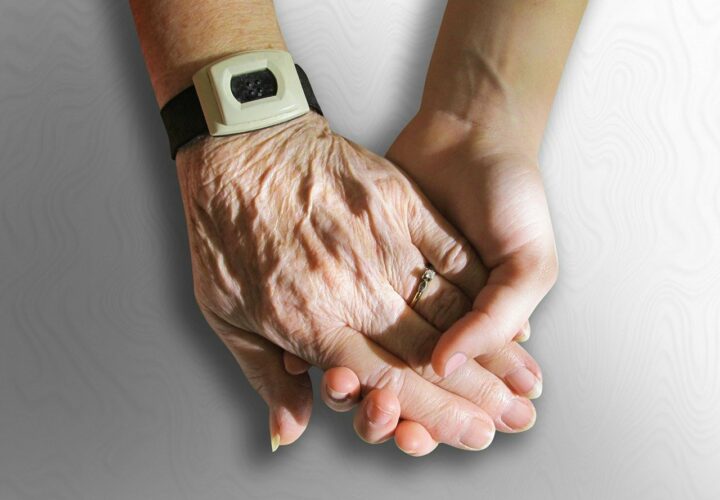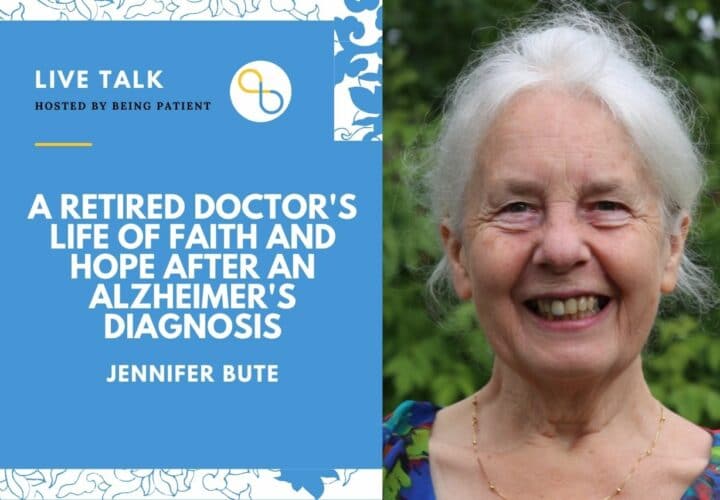In caring for someone with dementia, white lies or bending the truth can help keep the peace. Caregiving experts are split about whether it’s the right choice.
In “The Ethicist,” writer Chuck Klosterman’s weekly column for The New York Times, a question was submitted about the use of black floor mats in nursing homes. Black floor mats, the reader explained, may be used to discourage wandering residents with dementia from entering unsafe areas, including exits to the outside world. The idea is that people with dementia associate these black surfaces with looming voids to unknown depths. Using them establishes a fear in these residents, making them less likely to cross over these thresholds, for their own safety.
The black floor mat is an example of what is referred to as “therapeutic lying” — in this case, in the extreme. Healthcare professionals, scientists, and caregivers are among those who have long debated whether lying to someone with dementia is ethically acceptable, and whether it benefits their overall quality of life. The term therapeutic lying is, itself, an oxymoron: the first word is inherently good, the latter wrong and, even, immoral — which is why it’s also been termed less contradictory things: “therapeutic fibbing,” “creative communication techniques.”
The example of the black mats symbolizing dangerous holes in which someone (possibly already unsteady on their feet) might fall, in Klosterman’s opinion, is a lie that helps someone with dementia retain a sense of independence, by empowering them to make the choice to actively avoid danger. He posits that the other option — confining a resident — is immoral, taking away their agency.
On the other hand, one could argue both are traumatic for a person with dementia and should consider other ways to keep them safe.
Klosterman has no particular expertise in dementia. But his response reflects the hardy, ongoing debate in dementia communities around the benefits of small lies told to reduce anxiety, validate feelings, and keep someone with dementia out of harm’s way.
One perspective: Lying is never OK
Jennifer Bute, a retired doctor, began experiencing symptoms of Alzheimer’s in the early 2000s. Since her diagnosis, she’s used her expertise as a physician and person living with dementia to advise on strategies to live fully with a dementia diagnosis. One of her core beliefs is that it is never right to lie.
Recounting a conversation with a woman who was waiting for her deceased brother to arrive for a visit, Bute told Being Patient that she didn’t change the subject, but she also didn’t lie to the woman: “I said, ‘What do you remember best about your brother?’… I didn’t say he was coming.”
The woman eventually acknowledged her brother was dead after sharing stories about him with Bute.
While many believe people with dementia no longer live in reality, Bute personally understands that people aren’t completely lost or without their memories. She explained her thought process for occasions such as these. “To keep on board, you have to enter their reality and often they will then return to yours,” she said. “Make them feel that they are important and valued and accepted.”
Bute’s rationale relies on a gentleness necessary to soothe someone with dementia. It is frustrating for someone not to know where they are, or recognize faces of their loved ones, or wait a visit from someone who will never arrive. Her approach seeks to avoid reliving a traumatic or disappointing experience by, simply, avoiding.
It also supposes that the person looking for their loved one — or confusing the date or wondering why they cannot freely walk around their residence — will either forget they were mistaken, or eventually remember the facts, and in both instances, peacefully move on.
Another perspective: Lies can help — by reducing anxiety on all sides
Keeping the peace is also what proponents of therapeutic lying are trying to achieve. At first, it might seem like a cop-out: lying to avoid difficult conversations. While it is true that lying can also reduce the stress experienced by caregivers, those in favor of creative or therapeutic lies ask others to consider how it feels to be told they’re wrong. It hurts, and that hurt is compounded in individuals with dementia, as it is common for them to be agitated and frustrated even before being told their reality isn’t true.
Telling a lie to someone with dementia, as Klosterman argued in the case of the floor mats, can help the person maintain a sense of control and independence in their life. By lying, a caregiver is merely supporting that person’s reality. According to the Alzheimer’s Association, it is “important to put oneself in the shoes of your loved one and acknowledge how frightening” their situation must be.
In her memoir, Floating In The Deep End, Patti Davis, daughter of the former U.S. President Ronald Reagan, devotes a chapter to what she dubs “creative lying.” She recalls a few instances in which her father was existing in another time — these moments often occurring during periods of sundowning — and how lies made him less flustered or worried about skipping an obligation.
“During one of these episodes, my father believed it was morning and he needed to go to the office. We told him that the office called and said he didn’t need to come in because it was being fumigated, so no one was going to be allowed in,” Davis wrote. “He accepted that, and shortly afterward, forgot about going to the office.”
The goal is not to deceive or act maliciously. Similar to Bute asking questions about a woman’s deceased brother, Davis said asked questions that were meant to distract and move on from a specific ask. They each had the same goal: to keep the person for whom they were caring calm, satisfied, and grounded in their reality.
The benefits of of lying
Walking out the front door over a gaping “black hole” isn’t the only safety risk caregivers are trying to avoid by telling a lie.
Clinical psychologist Linda Ercoli uses driving as an example to support the use of therapeutic lying. It can be a kinder, gentler approach to confiscating car keys or even going as far as reporting someone to the Department of Motor Vehicles, she said, noting that a little well-intentioned, well-placed dishonesty can make the experience of having one’s freedom to drive taken away less traumatic, while achieving the goal of keeping people — not only the driver — safe.
“We know of really sad and horrible stories of people who drive and shouldn’t be driving,” Ercoli told Being Patient. “They get into a collision. They get hurt, or kill themselves or someone else, or they could end up lost and end up not being found or being found after they’ve been exposed to the elements.” Telling a tale of a car that’s being repaired when it was actually sold takes the hurt and indignity one might feel when hearing they pose a danger to others as a driver. It also makes a tough situation a little less traumatizing for the caregiver.
At the end of the day, the debate continues, and ultimate there no one “right” approach. Most caregiving experts can agree on one thing: No one should be judged for how they manage each day caring for someone with dementia. There will always be a balance to strike between the difficulty of lying to a loved one — especially when it’s the person who taught them that lying is wrong — and the difficulty in how more more cruel the truth can sometimes feel.
For caregivers struggling with this choice, Davis offered a consolation: “Lying in the service of kindness is not a punishable offense. In fact,” she said, “I suspect it earns us karma points.”




I incorporate most of these strategies when with my sister (early onset Alzheimer’s). A dear friend once told me “it’s better to be kind than to be right” and that has become my mantra.
The technique of therapeutic fibbing strikes a nerve with many caregivers of dementia patients. In Canada a dramatic comedy web series titled Therapeutic Fibbing was developed to show how the technique can be used in the real world.
The web series is produced by Equal Films featuring an everyday family utilizing – with varying levels of success – a form of compassionate lying to navigate communications with a loved one living with dementia. The series has had hundreds-of-thousands of views since its debut in the Fall of 2022. Several Canadian Dementia Networks reached out to thank the producers for creating Therapeutic Fibbing and asked if they could use the series in some of the training.
Feel free to watch some of the episodes for free on the Stories for Caregivers web site: https://storiesforcaregivers.com/series/therapeutic-fibbing/
Ross Sullivan
Vancouver, Canada
Thank you for bringing this series to our attention…We’ll check it out!